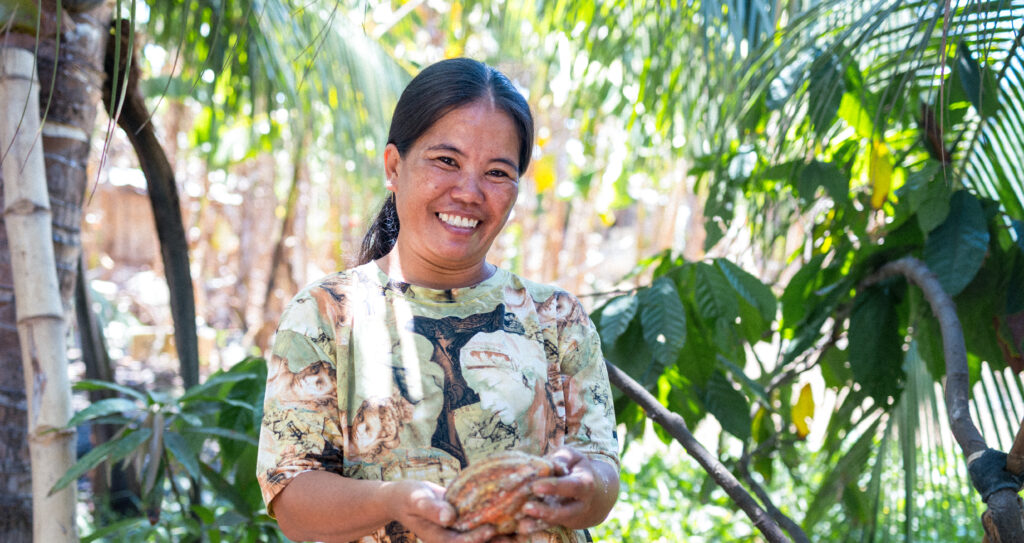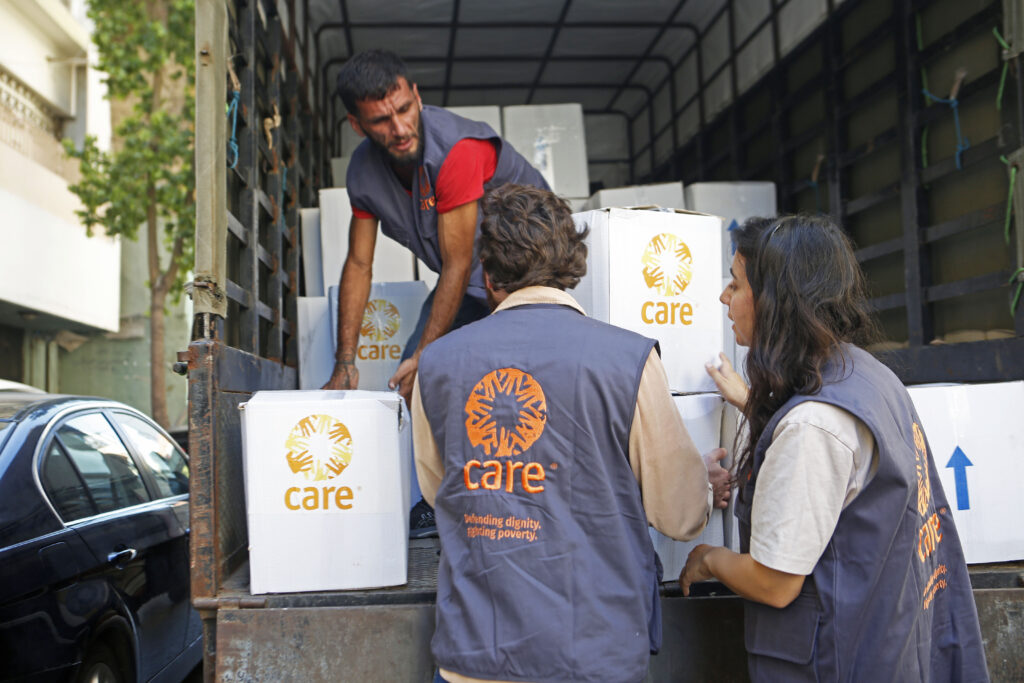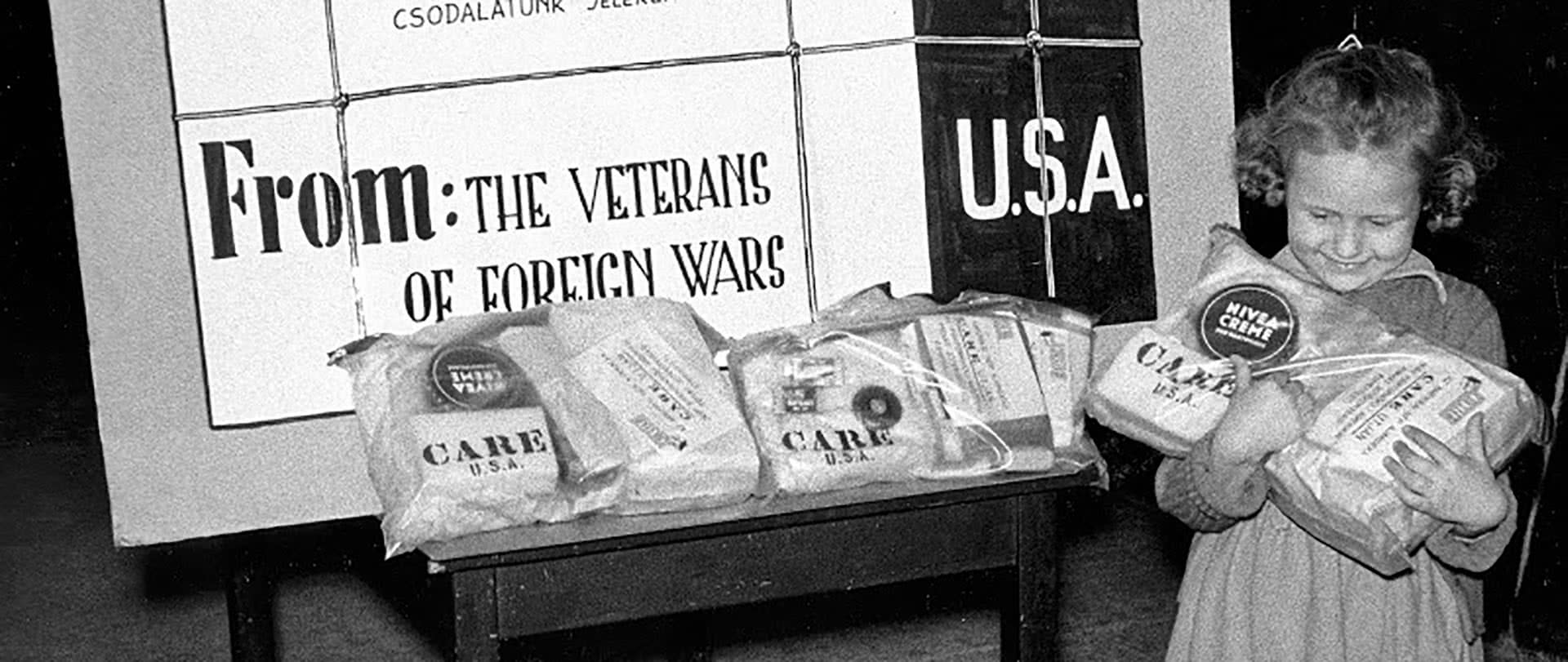80 years of CARE
CARE was founded in 1945 when 22 organisations came together to rush life-saving CARE packages to survivors of World War II. Those CARE packages arrived at a Viennese train station. Vienna was called the “hungriest city of the world” and people — especially the children — were suffering desperately from the horrific impacts of the war. These packages contained food and basic supplies to families facing hunger and poverty in post-war Europe.
As these countries began recovering, CARE’s work shifted from Europe to the developing world, including in Asia and Latin America. In the 1950s, CARE began using surplus food to feed the hungry in developing countries. Some 100 million CARE packages were sent over two decades.
The following decade, CARE pioneered primary healthcare programs and in the 1970s responded to massive famines in Africa with both emergency relief and long-term agricultural projects.
These days CARE International’s community development work spans 121 countries across regions including Asia, Africa, and the Middle East. Our work focuses on empowering communities to create their own lasting change.
Fast facts
- CARE originally stood for “Cooperative for American Remittances to Europe”
- Some 100 million CARE packages were sent to European nations post-war
- CARE International comprises a confederation of 21 International
Members, Candidates and Affiliates — including Australia
CARE Australia

CARE Australia is one member of the global CARE Confederation, working with communities all over the world — every one of us tightly focused on where we can each best support local communities to defeat poverty and social inequality.
CARE Australia works to defeat global poverty by supporting women to create lasting change in their communities around the world. Our programs focus on women because we know that when one woman breaks free from poverty, she brings another four people with her — and that’s a powerful multiplier.
We work in partnership with local community leaders to prepare for, respond to, and recover from humanitarian crises and shock. And we support people to determine their own futures by challenging unjust systems that keep people in poverty.
Malcolm Fraser
The man who helped Australia become a leader in international aid

The Rt Hon. Malcolm Fraser was one of Australia’s longest-serving prime ministers, having held the position for seven and a half years, between 1975 to 1983. As a leading supporter for the welcoming of refugees from Indochina and Vietnam, Malcolm Fraser became closely involved in the challenges international aid presented, an avenue many of his predecessors ignored. This led Malcolm to establish a review of programs and services for the sector, which included the establishment of the Special Broadcasting Service (SBS), to reflect Australia’s diversity.
Following his retirement from parliament after 28 years, Malcolm played an important role in supporting international humanitarian aid, caring deeply for people living in poverty and crisis around the world. Malcolm wanted to create the ‘Australian face of international aid’ when he became the founding Chair of CARE Australia in 1987 and President of CARE International from 1991. Malcolm believed that as rich and fortunate people, Australians had a responsibility to assist those in need. Malcolm placed himself in the midst of the world’s worst humanitarian crises, visiting CARE emergency operations, to witness the ordeal people were experiencing firsthand, and to support staff in their relief efforts.
Malcolm’s work in humanitarian aid was fondly regarded by many, including former PM Bob Hawke, who commended Malcolm for becoming “an outstanding figure in the advancement of human rights issues in all respects,” and he praised him for being “extraordinarily generous and welcoming to refugees.”
In 2002, Malcolm stated: “CARE can’t do it alone. The help that the Australian community provides CARE is essential for our continued existence.”
CARE Today

Today, CARE Australia is deeply committed to moving away from traditional aid models that reinforce paternalistic and neo-colonialist structures. Instead, we aim to empower local and women-led organisations to determine where funds can be best spent for long-term, systemic change. CARE Australia’s proximity to the Pacific Region and South-East Asia makes building relationships possible, productive and powerful.
We aim to be ‘as local as possible, and as international as necessary’, which means maximising the potential of local people and organisations before requesting international support. Even if international support is accepted, local leaders should have decision-making power and control over how resources are used.
Our vision is for a global network of local partners who are supported by CARE to keep their communities safe and thriving. But that doesn’t mean just working with local organisations who work in the same way we do. We also support social movements, because getting people to participate in informal action can be just as powerful as formal programs.
This way of working is smarter, more sustainable, and it puts resources into the hands of locals. It’s the very essence of what CARE is working towards — a world where everyone can determine their own future.
CARE Australia is primarily dependent on generous support from the Australian public and the Australian Government to continue our vital work. We thank all our donors. It’s through the incredible generosity of Australians that we were able to directly assist people across the globe. Please help us continue our work, donate today.

